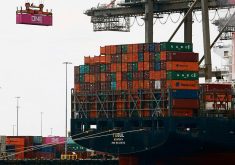Oslo | Reuters — Norway’s Yara and Chicago-based CF Industries are in talks about a merger of equals that would create a US$27.5 billion global fertilizer producer to rival world No. 1 PotashCorp in an oversupplied and fragmented market.
The deal would give Yara, the world’s biggest nitrate fertiliser maker, major production units in the U.S., where costs are lower due to cheap gas. CF Industries would gain a global footprint through Yara’s presence in 150 countries with production assets and a well established distribution network.
The two firms’ combined market capitalisation of $27.5 billion would put it almost on par with Saskatoon-based PotashCorp, the world’s largest fertilizer firm worth $28.9 billion (all figures US$).
Read Also

U.S. grains: CBOT futures extend gains as cold weather hits U.S.
Chicago grain and oilseed futures rose on Friday as severe cold in U.S. and other areas of the world raised fears about damage to crops and disruptions to processing plants.
The firms said in separate filings that the talks were at an early stage, and there were no assurances that these would result in any transaction.
Yara said it had been forced to go public because information about the talks were at a risk of a leak. It wanted to conclude the process quickly but said nothing was expected in the coming days.
Yara shares surged nearly nine per cent in early trade and were six per cent higher at 1330 GMT, valuing the company at $14.4 billion. CF rose 3.5 per cent in early trade, giving the firm market capitalization of $13.2 billion.
“At first glance, we view any future deal as positive for Yara,” JPMorgan said in a note. “A deal would diversify the company’s cost base away from Europe — which remains one of the most expensive production regions globally.”
“Yara could integrate its U.S. export/marketing business for example and expand its nitrate business into North America,” the note said.
The two firms fought a bitter battle in 2010 over control of U.S. rival Terra Industries, won by CF with a $4.7 billion offer. That deal also put Yara and CF into a 50/50 joint venture operating the GrowHow production units in Britain.
Analyst said regulatory concerns would be minimal as CF focuses on the U.S. while Yara has few U.S. operations. CF has major production assets while Yara is stronger downstream and it runs a coveted distribution network.
With the deal CF would gain access to global distribution while Yara would benefit from cheap U.S. gas, the main ingredient in ammonia, which forms the base of nitrate fertilizers used in agricultural crops.
Global fertilizer margins have been under pressure, mainly due to Chinese overproduction, and the International Fertilizer Industry Association expects global production growth to well outpace demand at least through 2018.
The association sees nitrogen fertiliser output rising nearly twice as fast as demand between 2014 and 2018, increasing the surplus in the market which could reach 9 percent of global production by 2018.
“In terms of revenues, Yara has the highest revenues but the lower margin, while CF has higher margin and lower revenues,” Per Haagensen, an analyst at RS Platou Markets said. “It seems to me that it is a pretty fair merger of equals.”
“I don’t think there will be a third company coming in and trying to join in because these are the two biggest nitrogen producers essentially.”
Yara’s Canadian holdings include Yara Belle Plaine, the former Saskferco nitrogen fertilizer plant at Belle Plaine, Sask., east of Moose Jaw, and a deep-water dry fertilizer terminal northeast of Montreal at Contrecoeur, Que.
CF’s Canadian assets, meanwhile, include the Canadian Fertilizers anhydrous ammonia plants and urea plant at Medicine Hat, Alta. and the CF anhydrous and urea plants at Courtright, Ont., south of Sarnia.
Government hurdle
Potentially the biggest hurdle to any deal would be the Norwegian government, which owns a 36.2 per cent stake in Yara.
The government said in June it would not cut its stake below 34 per cent and any change in that stance would likely require approval in parliament, an uphill battle as the government rules in a minority and relies on opposition parties to push through its agenda.
The trade ministry said it had not taken a position while the majority of parties contacted by Reuters said they could support the deal as long as the combined firm’s headquarters stayed in Norway and the state maintained a 34 per cent stake.
Another snag could be that Yara CEO Joergen Ole Haslestad will be stepping down and will be replaced by Norsk Hydro CEO Richard Brandtzaeg in February.
With U.S. gas prices trading near historic lows, Yara has been working to build capacity in North America and plans to build an ammonia plant with Germany’s BASF in Texas.
It has also been expanding rapidly in South America in recent years, buying Bunge’s Brazilian fertilizer business and acquiring the majority of Brazilian phosphate miner Galvani Indústria.
CF Industries in March sold its phosphate business to rival Mosaic Co. for $1.4 billion to focus on its core nitrogen fertilizer products. It has also been working on a $3.8 billion expansion of nitrogen fertilizer production in Louisiana and Iowa.
— Balazs Koranyi and Joachim Dagenborg are a bureau chief and reporter for Reuters respectively in Oslo. Additional reporting for Reuters by Ole Petter Skonnord and Gwladys Fouche.















